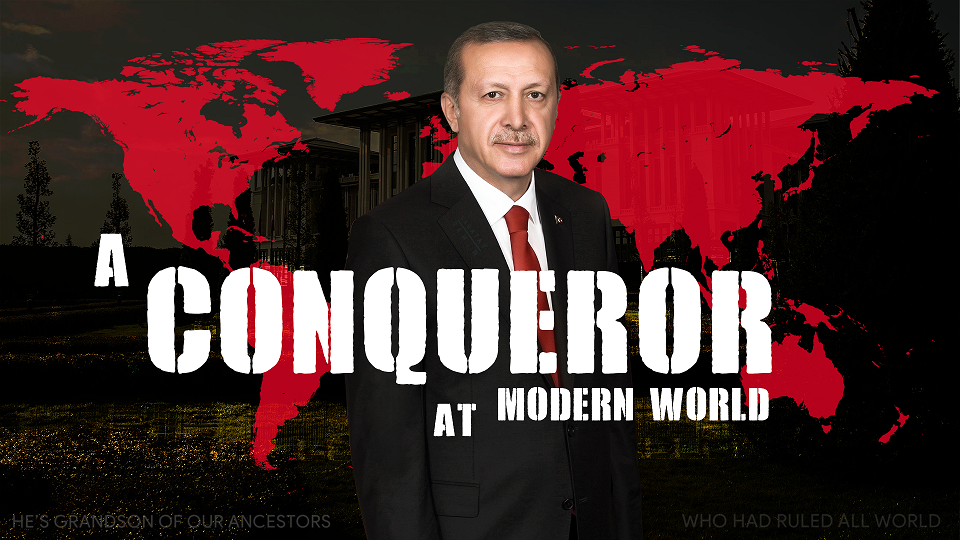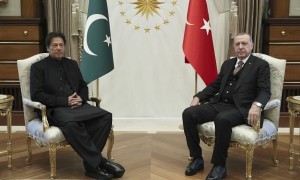Erdoğan & the Question of Resurrection of the Ottoman Empire
Abdul Rasool Syed
What Recep Tayyip Erdoğan is poised to do after the expiration of the Treaty of Lausanne by 2023? Is he really endeavoring to resurrect the Ottoman Caliphate? Almost every political discourse, nowadays, led by political luminaries, spin doctors and academicians, revolves around such questions. The whole world is curious to learn what Turkey, under the auspices of its ambitious leader Erdoğan, is likely to do beyond 2023. Further, to intensify the apprehensions of the foes of Turkey, exceedingly popular Turkish drama “Dirilis: Ertugrul,” which is premised on the history of the Ottoman Empire and is patronized by the Erdoğan administration, has also sent shockwaves across the world; for the drama is an implicit move of Turkish authorities to rejuvenate the struggle for reclaiming the Ottoman Empire.
As far as Erdoğan’s ambition to revive the Ottoman Empire is concerned, it is quite evident through his policies as well as orientations that he is paving the way to reclaim the Empire by hook or by crook once the Treaty of Laussane goes dead by 2023. Although denied, during teething period of his political ascent, his aspiration to re-install an Ottoman state, his recent inflammatory rhetoric and aggressive policies towards opposition, neighbouring states and international powers vividly reveal his desire to assume the title of “New Sultan” or “Caliph” in neo-Ottoman dispensation.
To translate his dream into reality, Erdoğan has taken myriad internal and external measures that clearly reflect his aggressive policy and passion to regain the lost glory of Muslims by resurrecting a dead empire. His bid to do so is conspicuous in his move of dismantling and restructuring of the Turkish identity through invoking the manifestations and symbols of the Ottoman heritage. Alongside, his domestic re-engineering, he has also adopted hegemonic and expansionist policies with the aim of reproducing the “Ottoman colonization” era in the Middle East region.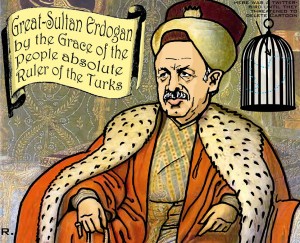
Let’s analyze how Erdoğan is flattening the ground locally and internationally for the resurrection of neo-Ottoman Empire.
Domestically, Erdoğan knows that without consolidating his power, it is almost impossible for him to put his brilliant brainchild of rebuilding the Ottoman Caliphate into a practice. Realizing this undeniable fact, he, therefore, resumed consolidating power in his own hands. To this end, he transformed Turkish political outlook from parliamentary to presidential one that, for sure, gave him absolute powers at par with those of a king or a sultan. Abdul Rehman Dilliak, a Turkish thinker affiliated with Erdoğan’s regime, opines that the transformation of Turkey’s presidential dispensation will allow Turkey to turn into a caliphate, Erdoğan to a caliph of Muslims, and will culminate into opening representative offices of the Ottoman Islamic caliphate at his palace.
In addition, following the footprints of sultans of the Ottoman Empire, Erdoğan has left no stone unturned to crush dissent. He employs the Ottoman legacy as a repressive tool to eliminate political opponents, seeking to put forward an ideology that is diametrically different from Mustafa Kemal Ataurk’s secularism. He attempts to do this through implementation of social reengineering tactics to influence the population to restore the Ottoman values and practices as part of the collective memory. This ensures his political hegemony and the exclusion of opponents, since he is part of the “Ottoman Sultans,” for whom the term “opposition” was not in the lexicon of their administration.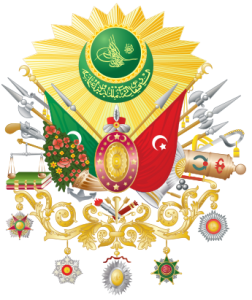
With an aim to keep the dissent voices at bay, Erdoğan, therefore, arrested a large number of opponents after the failed coup d’état attempt in July 2016. The crackdown included dismissal of state employees, police and military officers, restructuring the administrative apparatus of the state, domination over the judiciary, consolidating his power; making himself all in all by concentrating all legislative, executive and judicial powers into his own hands.
Erdoğan, indubitably, is a man of unprecedented political acumen. He knows that without giving his regime a religious tint, he would not be able to reach his destination. Hence, he is employing all of his occupied resources to morph secular turkey into an Islamized dispensation. For justification of all his just or unjust moves, he constantly takes refuge in Islamic cocoon. In his bid to Islamize Turkey, he has made religious education mandatory in Turkish schools, which, of course, confirms his intention to disinter Ottomanism.
Moreover, in order to rebuild the image of grandeur, magnificence and splendour that Ottoman Empire epitomized, among his countrymen and in the world, Erdoğan seeks to revive the historic and architectural patrimony of the Ottoman Empire. In July 2016, for example, he announced his intention to reconstruct some military barracks in Istanbul and to demolish the Ataturk Cultural Center, stating: “We will reconstruct the historic Taksim military barracks in Istanbul’s Gezi Park, whether they like it or not,” defying the opposition of many Turkish citizens.
Furthermore, in August 2016, Erdoğan renamed the largest bridge on the Bosphorus in Istanbul “Selim I,” amid intense opposition from Shi’ite Alawis in Turkey, due to their historical hostility towards Sultan Selim I.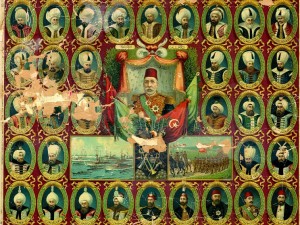
Erdoğan is also keen to use Ottoman Empire-inspired symbols in all the details of daily life. For example, he appeared in a photo posted on Twitter in November 2017, with the banner of the 57th Ottoman Army division in front of him.
In addition, he appeared in more than one official occasion – such as during his reception of Azerbaijani President Ilham Aliyev in January 2015- accompanied by contingent dressed in Ottoman warriors’ attires and carrying flags of 16 countries founded by the Ottomans. This component was added to the formal parades on a permanent basis. MP of Balikesir city from the Justice and Development Party posted a photo in which Erdoğan was surrounded by soldiers and commented by saying: “The 90-year-long Ottoman caliphate’s advertising break is over”.
Moreover, Erdoğan authorized the teaching of the Ottoman language in schools, announcing in December 2014 that “Teaching of the Ottoman language will inevitably be implemented…whether they like it or not.” He also slammed those who oppose the move, describing them as the greatest danger, believing that that the move will protect the identity of the state till the Day of Resurrection.
Moreover, on advice of Erdoğan, in January 2015, AKP members of parliament put forward a bill calling for the adoption of the Ottoman Empire “tughra” as the official emblem of the Turkish nation, which had been abolished in 1922 after the fall of the Ottoman caliphate. The Constitutional Affairs Committee of the Turkish National Assembly agreed on this proposal notwithstanding the opposition of the MPs. This too corroborates the fact that Erdoğan is aggressively pursuing his latent agenda of Ottomanization.
To add, the most appalling and terrifying aspect of Erdoğan’s scheme for his foes is his move to develop a new army “The New Janisaries,” at par with “Old Janisaries” under Ottoman rule, exclusively tailored to effect the idea of neo-ottoman empire. For example, leaks reported by the Turkish media and published by Fouad Avni, known as the “Snowden of Turkey” in January 2017, said that the SADAT International Defense Consultancy Inc, founded by Adnan Tanriverdi, Erdoğan’s advisor, is training young men from the Justice and Development Party for fighting.
As mentioned earlier, Erdoğan also encourages Turkish series and movies that show events dating back to the Ottoman era; one manifestation of this support was his visit, in November 2016, to the locations where the scenes of the “Diriliş: Ertugrul,” a series about the historical founders of the Ottoman state, were picturized.
By resorting to such moves, Erdoğan is playing very smartly. By adhering to the Ottoman principles and fanaticism of the Ottoman State, its history and symbols, Erdoğan wants to send an implicit message that he is the legitimate heir of the Ottoman Caliphate; a matter that has been repeatedly highlighted by the AKP’s media. For example, pro-Erdoğan newspapers put his portrait next to the image of Sultan Abdulhamid II, one of the strongest Ottoman sultans.
Externally, Erdoğan thinks that the Ottoman legacy gives the Turkish nation a historic right to regional hegemony and to represent the Muslim world. Thus, Erdoğan sees his meddling in the Arab countries, deploying military forces in Syria and Iraq, his support for extremist religious organizations in the Arab states as part of the “imperial policy” that reinforces his colonial vision of the Turkish role in the Middle East.
Erdoğan has also pursued regional expansion through constant interference in the affairs of other countries. His speeches reveal his attempts to interfere in the sovereignty of neighbouring countries. He tends to use an aggressive tone towards those whom he deems as “regional adversaries” of Turkey’s hegemony. Regional expansionism is not limited to only fiery rhetoric, as Turkey has backed extremist religious movements in several regional states and has provided them with shelter, sums of money and media platforms to propagate their ideas.
In the same regard, Turkey has engaged in direct military interventions in Syria and Iraq. It maintains a number of military bases in various countries, including Qatar, Northern Cyprus, Syria and Azerbaijan, where it built its first military base in November 2017, and plans to build another eight. All these factors clearly insinuate that Turkey is reasserting itself as an emerging regional hegemonic power.
To sum up, in the light of preceding discussion, it can safely be concluded that Erdoğan is aggressively pursuing his mission to reinstall the Ottoman Empire. He would, for sure, re-double his efforts to this end after the expiration of the Treaty of Lausanne by 2023. If things go as planned, the importance of Pakistan as the only Muslim country, having nuclear power, would enhance for Turkey and Turkey without genuine support of Pakistan, would not be able to regain its lost prestige and glory. Hence, Pakistan must tailor its foreign policy to meet this emerging new geopolitical reality.
 Jahangir's World Times First Comprehensive Magazine for students/teachers of competitive exams and general readers as well.
Jahangir's World Times First Comprehensive Magazine for students/teachers of competitive exams and general readers as well.
